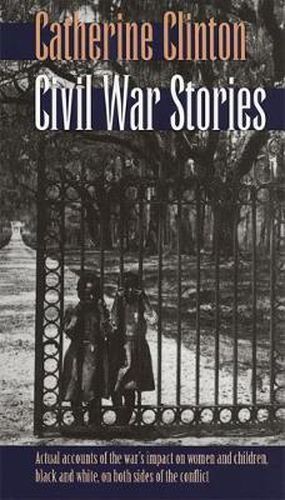Readings Newsletter
Become a Readings Member to make your shopping experience even easier.
Sign in or sign up for free!
You’re not far away from qualifying for FREE standard shipping within Australia
You’ve qualified for FREE standard shipping within Australia
The cart is loading…






Civil War Stories is Catherine Clinton’s fresh look at some everyday and extraordinary people whose lives were forever transformed by the impact of war. Her multifaceted perspective includes the stories of sisters, children, and friends torn apart by the crisis of Confederate independence, as well as those to whom silence was a way to keep the peace, although true peace would never again be restored.
Two sisters, one a staunch defender of the Union, the other a passionate advocate of the rebel cause, are traumatized by the divide the Civil War imposes. Thousands of orphans, scattered from Maine to New Orleans, learn the hard lessons of the war at an early age. Clinton urges us to reconsider this fatherless generation’s devastating losses. The war’s outcome was acrimoniously contested after Appomattox. The story of two South Carolina women, one black and one white, illuminates that fires of bitterness raged even after surrender.
Clinton suggests those on opposing sides sought to vindicate their losses and assert their rights by taking up the pen. The histories and memoirs she contrasts, the lives she reconstructs, and the stories she highlights provide appreciation of the cultural impact of the American Civil War, for those who endured it and for those of us who continue to be fascinated by its legacy.
$9.00 standard shipping within Australia
FREE standard shipping within Australia for orders over $100.00
Express & International shipping calculated at checkout
Civil War Stories is Catherine Clinton’s fresh look at some everyday and extraordinary people whose lives were forever transformed by the impact of war. Her multifaceted perspective includes the stories of sisters, children, and friends torn apart by the crisis of Confederate independence, as well as those to whom silence was a way to keep the peace, although true peace would never again be restored.
Two sisters, one a staunch defender of the Union, the other a passionate advocate of the rebel cause, are traumatized by the divide the Civil War imposes. Thousands of orphans, scattered from Maine to New Orleans, learn the hard lessons of the war at an early age. Clinton urges us to reconsider this fatherless generation’s devastating losses. The war’s outcome was acrimoniously contested after Appomattox. The story of two South Carolina women, one black and one white, illuminates that fires of bitterness raged even after surrender.
Clinton suggests those on opposing sides sought to vindicate their losses and assert their rights by taking up the pen. The histories and memoirs she contrasts, the lives she reconstructs, and the stories she highlights provide appreciation of the cultural impact of the American Civil War, for those who endured it and for those of us who continue to be fascinated by its legacy.